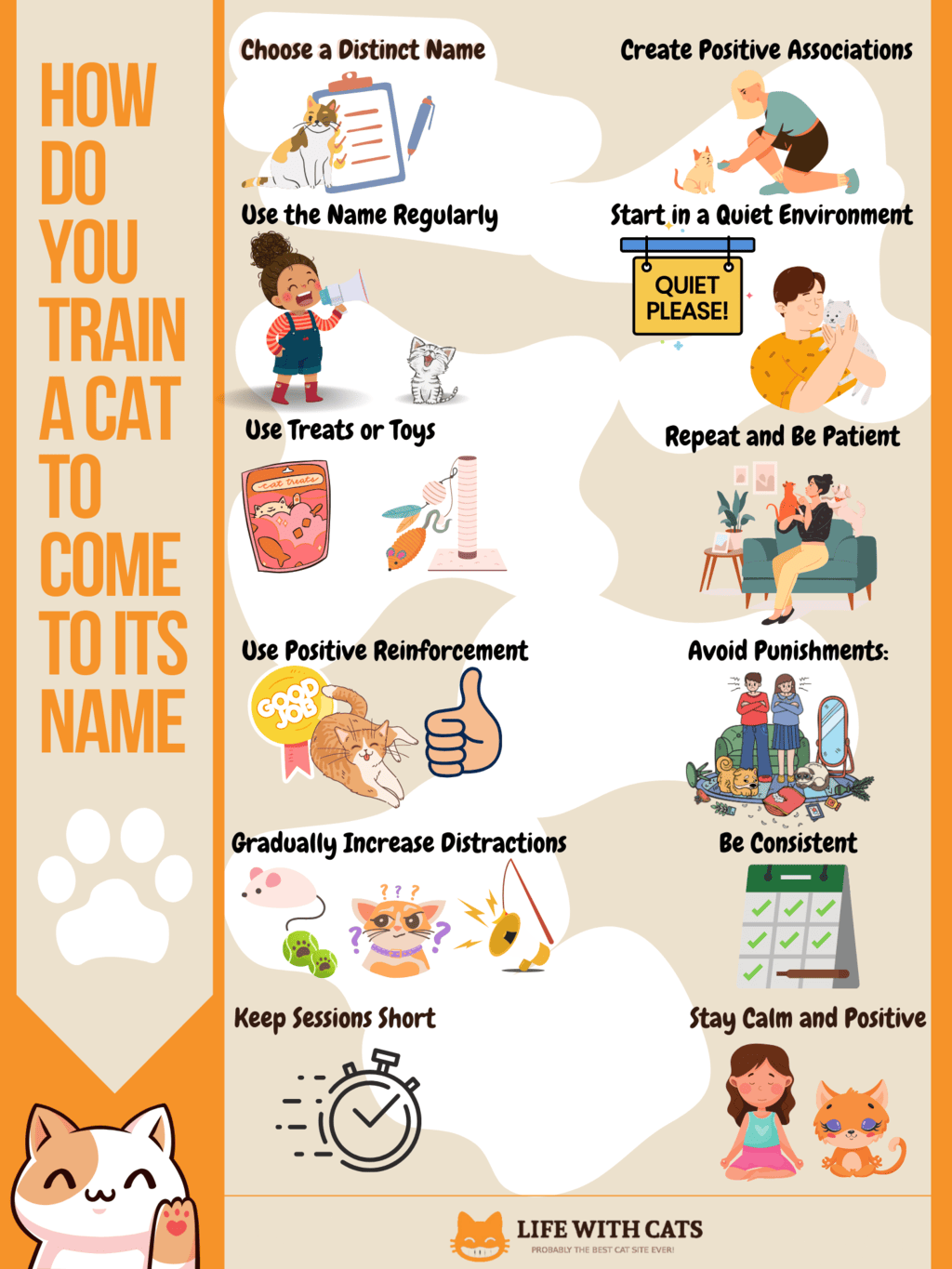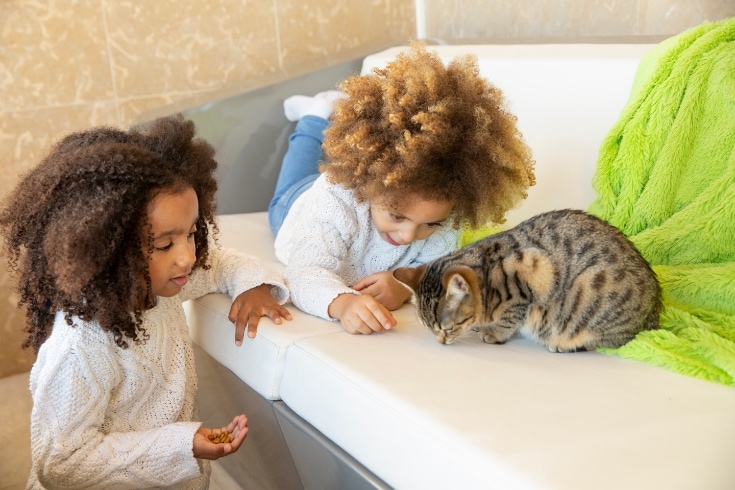Yes, you can teach a cat to learn her name, and she will come to recognize your voice over time!
Cats can learn to recognize and understand lots of different words, including food-related terms and simple commands, making training your cat fun and rewarding. You can use your cat’s talent to modify undesirable behaviors, provided you always use positive reinforcement techniques during her training and playtime sessions.
Keep reading to learn what are good cat names and find out how long it takes for your furry friend to learn her name!
Do Cats Know Their Names?
Yes, cats can recognize their names!
Although cats are not as responsive as dogs when their names are, studies suggest that felines can distinguish their names from other words. When consistently called by their names, many cats show some form of recognition, like turning their heads or ears in the caller’s direction.
It is likely that the feline’s ability to recognize recurring sound patterns and link them to specific reactions or outcomes is where their grasp of names stems from, rather than understanding names in the same way you and I do.
That said, it’s advisable to choose a short cat’s name that’s easy for your pet to remember and recognize.
Did you know that if a cat has had good experiences with hearing her name, like getting treats or affection, she is more likely to respond when she hears her name called? But don’t expect your pet to jump up and down like a dog! Your cat is more likely to just turn her head or meow.
The level of response depends on the cat’s personality, how close she is to the person calling her, and the situation she’s in.
Do Cats Recognize Their Owners?

Yes, cats do recognize their owners.
Contrary to a few misconceptions, cats are pretty good at picking up on human cues, and often recognize their owners because of scent, voice, behavior, and even how you move. Although a cat’s way of showing recognition or affection is typically more subtle compared to dogs, such as purring, slow blinking, or head bumping against you, many felines are strongly bonded to their humans.
Can Cats Recognize Voices?
Absolutely! Cats can recognize voices.
Cats have a keen sense of hearing, and over time, can become familiar with the sound of their owner’s voice. Studies have shown that cats can distinguish their owner’s voice from that of strangers. Amazingly, when played a recording of their owner’s voices, many cats responded by moving their heads or ears, even if they didn’t always come running.
So, while your kitty might seem nonchalant when you call, there’s a good chance she knows it’s you speaking!
Do Cats Understand Words?
Yes, cats can understand certain words!
Although your pet might not understand language in the same way that we do, she can understand certain words, phrases, and sounds through association and repetition.
What Are Some Words A Cat Understands?

Some common words and sounds that cats understand include their own name, food-related words, play-related sounds, purring and meowing, “no” or “stop,” positive reinforcement words, commands, and routine-related words, and we’ll expand on that in this part of our guide.
Their Name
The first word a kitten learns is usually her name. That’s because that particular word or sound is repeated over and over again during the early days of the kitten’s life. That said, I once adopted a former stray cat from a rescue center who had no name. I christened my new pet Harry, and it took him around a week to learn his name, which was pretty cool, considering he was in his early teens!
Choose a name that’s easy for your pet to remember and recognize. So, make it a short, distinctive sound, like “Tia” or “Boo.”
Food-Related Words
Mealtimes are a great time to teach your cat new words. For example, my cats know what “Kibble” and “Treats” are and go crazy when I utter those words and produce those tasty snacks.
Play-Related Sounds
Of course, you can use the food association thing to train your cats to understand play and training words through positive reinforcement.
So, when teaching your cat a new trick, like “sit” or “stay,” reward her with a tasty treat when she responds positively to your verbal cue. That way, your pet learns to associate performing the trick with the word and a reward.
Purring And Meowing
Be very careful when imitating your cat’s purring and meowing sounds! Although your cat makes those noises while playing, you have no idea exactly what she’s saying, and you could be sending mixed messages!
“No” Or “Stop”

If your cat does something undesirable like scratching your furniture, the words “No” or “Stop” are short, sharp, and easy for your cat to learn. As soon as your cat desists from attacking your sofa, reward her with kind words, a treat, or a fuss.
Positive Reinforcement Words
Positive reinforcement words like “Good girl” are pretty easy for your cat to understand and remember because they’re typically accompanied by a tasty treat or some other reward your cat appreciates.
Commands
Cats can learn simple commands if they’re backed up by positive reinforcement. So, if you ask your cat to roll over and reward her immediately she does what you ask, your pet will associate that word and sound with a positive experience, so she’s more likely to respond to it in the future.
Routine-Related Words
Routine-related words are also fairly memorable for cats. For example, if being let out into the backyard in the morning is part of your pet’s routine, the word “Out” she will quickly associate that word with an important part of her routine.
Both my cats understand “out” and meow in response when I ask if that’s what they would like to do.
How Do You Train A Cat To Come To Its Name?

Training a cat to know their name is one of the first things you will do and it’s actually quite simple. In fact, you’ll be amazed how quickly your pet gets to recognize her moniker!
Here’s how to train a cat to come to its name!
Choose A Distinct Name
Start by choosing a very distinct name that’s short and easy for your cat to remember. Names with only one or two syllables are the best choice, and those with distinctive sounds are the easiest for your cat to recognize.
Create Positive Associations
Your cat is much more likely to come when you call her if she knows she will get a reward. The reward could take the form of an edible treat, a cuddle, or even a game with your cats favourite toy.
Use The Name Regularly
The more often your cat hears her name, the quicker she will remember it, so be sure to use her name regularly.
For example, when grooming your cat, feeding her, training, and playing with her, always use her name frequently.
Start In A Quiet Environment
Although cats are intelligent and they do learn relatively quickly, they can be easily distracted, so it’s best to start training your cats to come when you call her in a quiet environment where you want to be disturbed.
Use Treats Or Toys

Your cat needs some kind of motivation to want to come to you when you call her, so use treats or toys to tempt her. If you have a cat who isn’t inspired by food rewards, you might find that petting her is equally well-received.
Repeat And Be Patient
Most cats learn their names and will come when called relatively quickly, but others take much longer, especially former strays and those from an uncertain background. Be patient when training your cat, and be prepared to repeat and reinforce her lessons.
Use Positive Reinforcement
As with all your training and playtime sessions, you must use positive reinforcement to reward your cat when she does as you ask her.
You can use food rewards, such as training treats, a game with a favourite toy, or a petting session to show your cat she has done the right thing and make her more likely to repeat the behavior in the future.
Avoid Punishments
Never punish your cat if she seems slow to catch on to what you want her to do. Punishment will probably frighten your cat and almost certainly make her resentful, setting back your training, and damaging the bond you are working so hard to create.
Gradually Increase Distractions

As your cat begins to learn her name, you can gradually increase the distractions in her training environment. Hopefully, you will still be attentive and come to you when you call her. If you have outdoor cat, the acid test of your training will be calling her in from the backyard, especially if you have twittering birds or traffic noise to contend with.
Be Consistent
Your cat won’t remember her name if you keep changing it or shortening it, so be consistent once you’ve decided on a name you like for your pet.
Keep Sessions Short
Cats have a relatively short attention span, so keep your training sessions short. Sometimes, it can work well to take a short playtime break, and then go back to training your cat. You can continue using your cat’s name throughout the playtime, if effectively sneaking in some training undetected!
Stay Calm And Positive
Even if you get frustrated because your cat seems to be taking forever to learn her name, try to stay positive and remain calm. There’s no point losing your temper or becoming impatient with your pet if the penny doesn’t drop right away.
How Long Does It Take For A Cat To Learn Its Name?

Every cat is unique and has her own personality, so there’s no one-size-fits-all answer to that question!
Some cats are very fast learners and might learn their name within a matter of days or a week, especially if they are young kittens.
It can take longer for older and senior cats, but you can speed up the process by asking your family and friends to call the cat by her name every time they interact with her. Don’t forget to remind your household to reward the cat when she acknowledges her name!
What Are Some Common Cat Names?
Here are some common cat names that might give you some inspiration when choosing a suitable name for your new feline friend.
| Female cat names | Male cat names | Unusual and funny cat names |
|---|---|---|
| Nicole | Charlie | Scuttlebutt |
| Bella | Felix | Goofy |
| Misty | Finley | Zuzu |
| Molly | Quinn | Marmite |
| Daisy | Ralph | Major Tom |
| Tilly | Oscar | Mertle |
| Luna | Milo | Rebel |
| Lily | Graham | Scooby |
| Lilly | Tigger | Felix |
| Yzabella | Alfie | Twinkle Toes |
| Jove | Jasper | Harriet Potter |
| Betty | Max | Pluto |
| Missy | Tiger | Fish Biscuit |
| Sophie | Simba | Chewbacca |
| Belle | Bob | Bogart |
| Cleo | Casper | Bambi |
| Izzy | Fred | Nemo |
| Pat | Freddie | Vardy |
| Mika | Nico | Ming Ming |
| Tia | Gizmo | Spartapuss |
FAQs
In this part of our guide, we answer some of the most frequently asked questions about cats’ ability to recognize human voices and learn their names.
Can All Cats Recognize Their Owners?
Yes, although cats are known for their independent nature, they can recognize their owners. Your cat might show subtle signs of knowing you, such as rubbing against you, meowing, or purring when you come home.
My cats always hurry down the driveway and roll over on their backs when they see me arrive. Now, they don’t do that when the mailman calls, so I’d say they definitely know me!
What Cues Do Cats Use To Identify Their Owners?
Cats use a complex array of senses to help identify and recognize their owners.
One of the main ways cats recognize their owners is through scent. Your cat has scent glands on various parts of their bodies which is why they often rub against their owners, marking them with their scent.
Most cats respond to their names being called or to other familiar vocal cues given by their owners, using the tone, pitch, and specific sound of your voice to help identify them. Cats are creatures of habit, quickly learning routines, so when you come home at a particular time to feed your cat, she might use that routine as a cue to identify you. The way you pet, handle and interact with your cat can also be a unique identifier since cats can recognize the specific touch of different people.
Do Indoor And Outdoor Cats Show Different Recognition Patterns?

Yes, indoor and outdoor cats have different ways of recognizing their owners.
Indoor cats are mainly exposed to specific stimuli, such as household members, objects, and familiar noises.
In contrast, outdoor cats come across a much wider range of stimuli, including different animals, changing landscapes, and various sounds and scents. That exposure makes outdoor cats more alert and aware of potential threats, hunting opportunities, and changes in weather conditions. As a result, they are often more cautious and vigilant compared to indoor cats.
Can Cats Recognize Their Owners’ Scent?
Yes, cats have a keen sense of smell and can recognize their owners’ scent.
A cat’s olfactory system is far more advanced than ours, with up to 200 million odor-sensitive cells in comparison to your paltry five million. That acute sense of smell allows your cat to identify you and individual family members, mark territory, find mates, and more.
When your cat rubs against you, she’s effectively marking her territory with scent glands located in her cheeks. That behavior not only leaves your cat’s scent on you but also allows her to pick up on your unique scent, reinforcing recognition and bond.
How Long Does It Take For A Cat To Learn Its Owner’s Voice?
The length of time it takes for a cat to learn its owner’s voice depends on several factors.
- The age of the cat – kittens learn more quickly than older cats
- The cat’s background – shelter cats and strays can take longer
- The individual cat – some learn more quickly than others
- How much time you have to devote to training your cat
However, most cats can learn to recognize your voice in a matter of days or we
Are Some Cat Breeds More Likely To Recognize Their Owners?
While individual personalities can vary widely within any breed, some cat breeds are known for their strong attachment and loyalty, meaning they’re more likely to recognize their owners.
For example, breeds like the Siamese, Ragdoll, and Burmese are often described as almost “dog-like” and might recognize and bond with their owners more readily than some other breeds.
However, it’s important to note that recognition and bonding are influenced by a combination of genetics, socialization, and individual temperament rather than breed alone. So, all cats, regardless of their breed, can recognize and form strong bonds with their humans.
Can A Cat’s Recognition Of Its Owner Fade Over Time?
Yes, a cat’s recognition of its owner can fade over time, especially if there’s prolonged separation.
Cats have strong memory retention, especially for places or experiences they associate with strong emotional reactions, but they are also creatures of habit. If you haven’t seen your cat for a while, the once-familiar sensory imprints of their owner, such as scent and voice, will fade. However, even if your pet doesn’t recognize you right away, many cats will re-establish their bond with a former owner after a little time.
And, as you can see from these tear-jerking true stories, many cats can remember their owners after years of separation.
What Can I Do To Strengthen My Cat’s Recognition Of Me?

You can strengthen your cat’s recognition of you by spending lots of quality time with them daily, playing, grooming, and simply cuddling and snuggling with your pet. Chat to your cat using the same words, phrases, and tone, as cats often recognize voice patterns, and give your furry friend lots of treats and affection to create a positive vibe around you.
Be sure to pet your cat and let her rub against you. That deepens your bond and helps your cat mark you with her scent and get to know yours.
Why Do Some Cats Seem Indifferent To Their Owners?
Cats, like humans, have distinct personalities that can make some of them appear indifferent to their owners. That can be down to a combination of factors such as individual temperament, lack of early socialization, and negative past experiences.
If a cat is not socialized properly during her critical developmental period, she might avoid human company. In addition, negative experiences with humans can make a cat less trusting and she won’t want to spend time around people.
Is It Possible For A Cat To Confuse Its Owner With Someone Else?

Yes, it is possible for a cat to confuse its owner with someone else.
Cats rely heavily on their sense of smell to recognize their owners and other people they come into contact with. So, if you’ve been around other people or animals with strong scents, your cat might become confused and get you muddled with someone else.
Also, cats can get disoriented following a house move or if you’ve made significant changes to your appearance, such as dyeing your hair or growing a beard.
Conclusion
Cats can get to know their names and recognize voices over time. How cool is that!
The trick to having your cat learn her name is to choose a short, punchy monicker with distinctive sounds that are easy to remember, repeat it often, and train your cat to associate coming to you with rewards and lots of verbal praise. Make sure your family uses your cat’s name whenever they’re around her to familiarize your pet with her name and their voices.
Cats can understand simple words like those associated with food and their daily routine, and they can learn verbal cues, making training your pet to perform simple tricks fun and extremely rewarding.
Your remarkable cat can even get to know your scent and recognize you from a distance!